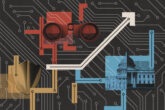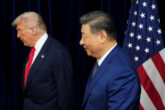August 03, 2022
Help U.S. Companies Compete Against China on Technology Standards
The Chinese government has made leadership in international technology standards setting a key priority and it is working to give their firms an unfair leg up. While the U.S. government needs to defend the current voluntary, industry-led standards process in the face of this unfair competition, they also need to play a more active helping role. To do that Congress should modify the research and experimentation tax credit to allow international standard setting costs to qualify as expenditures for purpose of the credit. This will help U.S. firms better afford standards setting activities, helping them win over China.
What makes standards and the standard-setting process even more important now is the geopolitical context. Technology is the main enabler of economic, political, and military power.
Standards are universal technical specifications agreed to usually by commercial actors, and sometimes involving governments and non-governmental organizations. The standard-setting process is a voluntary one, typically conducted on an international basis and led by industry. The spirit and intent of standard-setting is based on technological merit; the best technology is chosen as standard.
When standards are global, they underpin interoperability around the world and facilitate trade. Think, for example, of how one can seamlessly use a new smart phone almost anywhere in the world. A concerted effort toward standardization eliminated the need to swap SIM cards to connect to another country’s cellular network. At the same time, charging that phone abroad is likely to require an adapter to fit one of the 15 wall socket designs in use internationally because electric plug standards were developed before global standards were the norm.
Real the full article from RealClearPolicy.
More from CNAS
-
Transatlantic Security / Technology & National Security
Look Before We Leap on Artificial IntelligenceThis article was originally published on The Dispatch. A debate about the role that artificial intelligence should and will play in society, and how it will affect humanity fo...
By Jon B. Wolfsthal
-
Technology & National Security
Caleb Withers on the Cybersecurity Frontier in the Age of AICaleb Withers, research associate at the Center for a New American Security, joins Kevin Frazier, the AI Innovation and Law Fellow at the University of Texas School of Law and...
By Caleb Withers
-
Technology & National Security
Prepared, Not ParalyzedExecutive Summary The Trump administration has embraced a pro-innovation approach to artificial intelligence (AI) policy. Its AI Action Plan, released July 2025, underscores t...
By Janet Egan, Spencer Michaels & Caleb Withers
-
Indo-Pacific Security / Technology & National Security
Sharper: Tech + ChinaRecent talks between President Donald Trump and Chinese Communist Party General Secretary Xi Jinping placed a spotlight on emerging technologies, from high-end chips to minera...
By Charles Horn & Sevi Silvia




